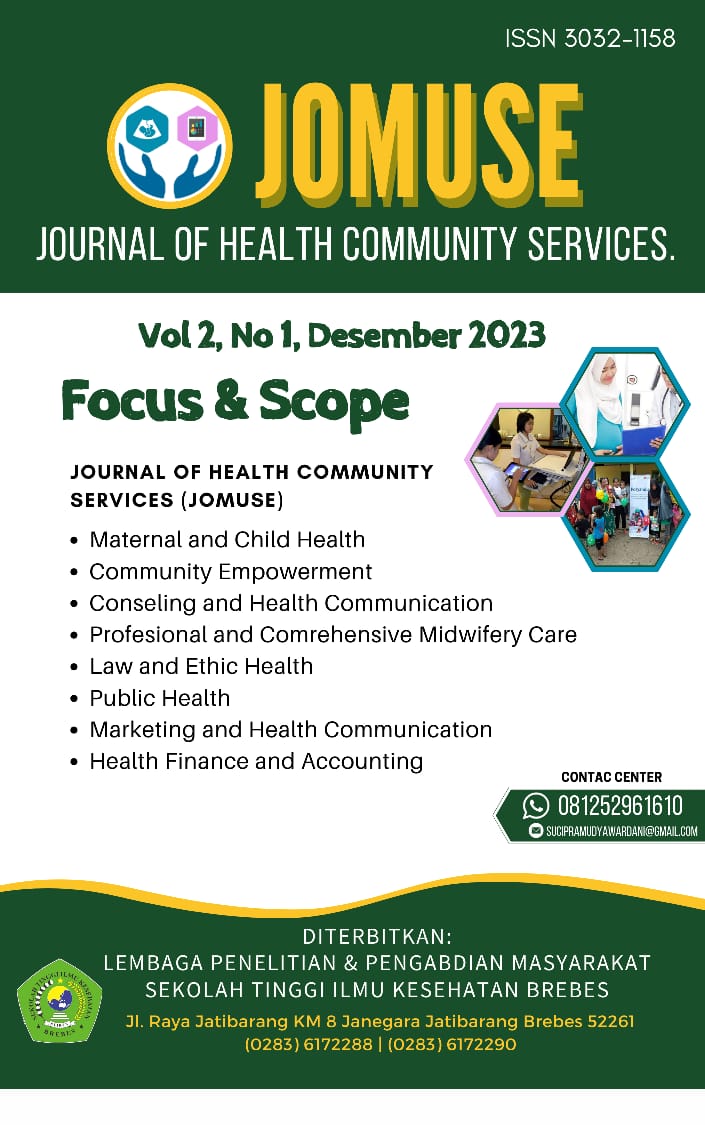PENYULUHAN PENTINGNYA ASI PADA IBU YANG MEMILIKI ANAK 0–7 HARI
Abstrak
Berdasarkan data WHO tahun 2022 hanya 20% negeradi Dunia yang memberikan pemberi kerja menyediakan cuti melahirkan dalam tanggungan dan fasilitas untuk menyusui atau memerah asi, serta kurang dari separuh bayi dibawah umur 6 bulan yang mendapatkan ASI ekslusif. Cakupan ASI ekslusif Indonesia pada 2022 tercatat hanya 67,96%, sedangkan pada tahun 2021 mencapai angka 69,7%, berdasarkan data tersebut menunjukkan bahwa kita sebagai tenaga kesehatan harus memberikan dukungan yang lebih intensif agar cakupan angka ASI ekslusif tercapai sesuai dengan targer yang sudah ditentukan. Tujuan: untuk meningkatkan pengetahuan ibu yang memiliki bayi 0 – 7 hari terhadap pentingnya ASI untuk kehidupan bayi . Metode: ceramah serta tanya jawab dengan jumlah peserta sebanyak 30 orang Responden. Kesimpulan: penyuluhan tentang pentingnya ASI pada ibu yang memiliki anak 0 -7 hari diterima dengan baik dan lancar, responden aktif bertanya dan sangat antusias terhadap topik yang disampaikan. Saran: diharapkan penyuluhan tentang ASI lebih banyak dilakukan agar kualitas hidup dari anak lebih baik serta pemberian pemahaman tentang ASI sebaiknya dilakukan sejak dini agar ibu dapat mengetahui tentang ASI dan kebermanfaatannya.
Referensi
Badan Pusat Statistik Indonesia. (2023). Persentase Bayi Usia Kurang Dari 6 Bulan Yang Mendapatkan Asi Eksklusif Menurut Provinsi—Tabel Statistik. https://www.bps.go.id/id/statistics-table/2/MTM0MCMy/persentase-bayi-usia-kurang-dari-6-bulan-yang-mendapatkan-asi-eksklusif-menurut-provinsi.html
Brandtzaeg, P. (2003). Mucosal immunity: Integration between mother and the breast-fed infant. Vaccine, 21(24), 3382–3388. https://doi.org/10.1016/s0264-410x(03)00338-4
Chirico, G., Marzollo, R., Cortinovis, S., Fonte, C., & Gasparoni, A. (2008). Antiinfective properties of human milk. The Journal of Nutrition, 138(9), 1801S-1806S. https://doi.org/10.1093/jn/138.9.1801S
Dukuzumuremyi, J. P. C., Acheampong, K., Abesig, J., & Luo, J. (2020). Knowledge, attitude, and practice of exclusive breastfeeding among mothers in East Africa: A systematic review. International Breastfeeding Journal, 15(1), 70. https://doi.org/10.1186/s13006-020-00313-9
Goldman, A. S. (2012). Evolution of immune functions of the mammary gland and protection of the infant. Breastfeeding Medicine: The Official Journal of the Academy of Breastfeeding Medicine, 7(3), 132–142. https://doi.org/10.1089/bfm.2012.0025
Horta, B. L., Loret de Mola, C., & Victora, C. G. (2015). Long-term consequences of breastfeeding on cholesterol, obesity, systolic blood pressure and type 2 diabetes: A systematic review and meta-analysis. Acta Paediatrica (Oslo, Norway: 1992), 104(467), 30–37. https://doi.org/10.1111/apa.13133
Isolauri, E. (2012). Development of healthy gut microbiota early in life. Journal of Paediatrics and Child Health, 48 Suppl 3, 1–6. https://doi.org/10.1111/j.1440-1754.2012.02489.x
Kau, A. L., Ahern, P. P., Griffin, N. W., Goodman, A. L., & Gordon, J. I. (2011). Human nutrition, the gut microbiome, and immune system: Envisioning the future. Nature, 474(7351), 327–336. https://doi.org/10.1038/nature10213
Kramer, M. S., & Kakuma, R. (2012). Optimal duration of exclusive breastfeeding. The Cochrane Database of Systematic Reviews, 2012(8), CD003517. https://doi.org/10.1002/14651858.CD003517.pub2
Mullany, L. C., Katz, J., Li, Y. M., Khatry, S. K., LeClerq, S. C., Darmstadt, G. L., & Tielsch, J. M. (2008). Breast-Feeding Patterns, Time to Initiation, and Mortality Risk among Newborns in Southern Nepal,. The Journal of Nutrition, 138(3), 599–603.
Nelson, W. E. (2016). Nelson textbook of pediatrics (R. Kliegman, B. Stanton, J. W. St Geme, N. F. Schor, & R. E. Behrman, Eds.; 20th edition). Elsevier. https://www.clinicalkey.com/dura/browse/bookChapter/3-s2.0-C20120035867
PP No. 33 Tahun 2012. (2012). PP No. 33 Tahun 2012. Pemerintah Pusat. http://peraturan.bpk.go.id/Details/5245/pp-no-33-tahun-2012
Veghari, G., Mansourian, A., & Abdollahi, A. (2011). Breastfeeding Status and Some Related Factors in Northern Iran. Oman Medical Journal, 26(5), 342–348. https://doi.org/10.5001/omj.2011.84
WHO. (2023). World Breastfeeding Week. https://www.who.int/indonesia/news/events/world-breastfeeding-week/2023
Ystrom, E., Niegel, S., Klepp, K.-I., & Vollrath, M. E. (2008). The impact of maternal negative affectivity and general self-efficacy on breastfeeding: The Norwegian Mother and Child Cohort Study. The Journal of Pediatrics, 152(1), 68–72. https://doi.org/10.1016/j.jpeds.2007.06.005
Unduhan
Diterbitkan
Cara Mengutip
Terbitan
Bagian
Lisensi
Hak Cipta (c) 2024 JOMUSE : Journal of Health Community Services

Artikel ini berlisensi Creative Commons Attribution-NonCommercial-NoDerivatives 4.0 International License.

